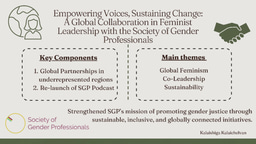LiA Week 5 Log
This week marked a significant milestone in our podcast project: I conducted my first interview with a founding member of SGP. It was an incredibly rewarding experience, not just because it was my first time conducting an interview of this nature, but also because of the depth of insight I gained into the co-leadership model that SGP embodies.
Co-leadership is a central pillar of SGP’s organizational structure, and this interview really brought to life the value of this model. The concept of co-leadership at SGP is about more than just sharing responsibilities; it’s about fostering a collaborative environment where different perspectives are valued and where decision-making is a collective process. This approach helps to deconstruct traditional hierarchies and promotes a more inclusive and equitable workplace. It’s a model that challenges the often rigid and vertical structures found in many organizations, which can be particularly exclusionary to women and other marginalized groups.
As I listened to the founding member discuss the intricacies of co-leadership, I was reminded of the research I conducted last year on women in leadership and the persistent vertical gap that exists in many industries. That research highlighted the need for alternative leadership models that can better support diversity and inclusion, and hearing about SGP’s co-leadership approach was incredibly affirming. It reinforced the idea that leadership doesn’t have to be a solitary endeavor and that there’s real value in creating structures that distribute power and responsibility more evenly.
In addition to the interview, I got the opportunity to meet with a gender expert and conduct another interview, further expanding my understanding of how co-leadership functions in practice at SGP. The interview process went smoothly, and we successfully recorded the session, which will be a key part of our first podcast episode. We’ve planned to conduct up to six interviews with different founding figures of the organization, which will give us a rich array of perspectives to weave into our narrative.
One of the challenges we’re navigating is the complexity of recording these interviews separately, rather than all at once in a live setting. This adds a layer of difficulty in terms of ensuring consistency and cohesiveness across the episodes. To address this, I took the time to map out how we could format the co-leadership topic into a two-part series. This involved thinking carefully about how to structure the episodes, so they flow naturally and tell a compelling story, even though the content is being recorded in segments.
With the structure in mind, I created an updated host script that includes a more detailed introduction and conclusion, framing the narrative for each episode. The goal was to ensure that the episodes not only inform but also engage listeners, providing a clear and cohesive narrative that ties together the various interviews and insights. I focused on making sure that the host script would guide the listener through the topic of co-leadership, highlighting its significance and how it has shaped SGP’s unique approach to leadership and organizational culture.
Reflecting on the week, I feel a deep sense of accomplishment. Conducting the interview was a valuable learning experience, and it was inspiring to hear firsthand about the principles that guide SGP’s leadership. The process of mapping out the episodes and refining the script has also given me a greater appreciation for the art of storytelling, particularly in a podcast format where the narrative needs to be both informative and engaging.
Looking ahead, I’m excited to continue with the remaining interviews and to see how the episodes come together. There’s still a lot of work to be done, but I’m confident that we’re on the right track. This week has reinforced the importance of thoughtful planning and clear communication, both in the way we conduct the interviews and in how we craft the final product. I’m eager to see how our exploration of co-leadership will resonate with our audience and contribute to the broader conversation on gender and leadership.

Please sign in
If you are a registered user on Laidlaw Scholars Network, please sign in